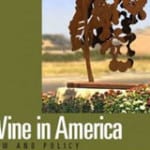
Professors Calvin Morrill and Lauren Edelman ’86 have co-authored the first empirical study on how law impacts daily life in high schools. The award-winning article reveals that students and teachers rarely file suit or pursue mediation after a rights violation.

Two faculty members explore the link between citizenship and inequality in an online symposium produced by Issues in Legal Scholarship, of which professor Dan Farber is editor-in-chief. Professor Leti Volpp edited and wrote an introduction for the symposium, “Denaturalizing Citizenship,” which dissects two leading books on the issue. Professor Sarah Song penned a chapter called “Rethinking Citizenship through Alienage and Birthright Privilege.”

How should government research subsidies be allocated: What percentage should go to commercial firms and how much to academia? Should the law protect knowledge created by university research? In a paper presented to the American Economic Association, Professor Suzanne Scotchmer suggests a mix of subsidies that would enable university researchers to focus on ideas, while for-profits focus on innovations.

Are courts accepting workplace anti-discrimination policies at face value even when they’re ineffective? A new study co-authored by Professor Lauren Edelman ’86, former faculty member Linda Krieger, Scott Eliason, Professor Catherine Albiston ’93, and Virginia Mellema ’87 reveals a disturbing trend of “judicial deference to institutionalized organizational structures” that undermines civil rights law.

Should government rescue a bank that’s “too big to fail?” In A Model of Optimal Corporate Bailouts, Eric Talley analyzes the pros and cons, weighing social gain against financial risk. Talley and co-authors explore when (and if) bailouts are justified and propose a model for analyzing the tradeoffs.
_rdax_219x160-150x150.jpg)
A new study by Professor Robert MacCoun finds that Dutch teens smoke less weedand have a harder time getting itthan U.S. youth. The findings are surprising, given Hollands numerous adults-only clubs where pot is plentiful. Read more here.

In a new article, Diffusion through Democracy (American Journal of Political Science), Assistant Professor Katerina Linos examines why international norms can often trigger major national legal reforms. Read about it here.
Â

In the wake of Governor Jerry Brown’s plan to move prisoners to county jails, California could be one of the first states to close its state-run youth facilities. A policy paper by criminal justice expert Barry Krisberg, who heads the Warren Institute on Law and Social Policy, reviews California’s progress in juvenile prison reform and the challenges that remain.

Consumers typically don’t read contracts, blissfully unaware of hidden traps. The result can be nasty: subprime mortgage crisis, anyone? Assistant professors Victoria Plaut and Robert Bartlett tackle this issue within a notorious domain: Internet click-through agreements. Their article suggests ways to increase readership so consumers can avoid contract pitfalls.

Attorney and wine law expert Richard Mendelson, who established Berkeley Law’s Program on Wine Law and Policy, has published a new book. Called “Wine in America: Law and Policy,” the book explains the federal, state, and local laws that govern wine production, taxation, marketing, distribution, and sales. It’s the first textbook on wine law and policy in the U.S.

New York’s High School Regents Exams are plagued with “pervasive,” but probably altruistic, manipulation of borderline student test scores, a study by Professor Justin McCrary has found. Along with three co-authors, McCrary finds evidence that teachers boost scores just enough to push students over key “performance thresholds.” (Photo by Newsday)

City street designs contribute to greenhouse gas increases by discouraging foot traffic, bicycles, and transit use, a new report from Berkeley Law’s Center for Law, Energy and the Environment says. In the City Streets Project report, the authors examine the basis for regrettable street design habits, and consider better alternatives.

Should intangible itemscreations by musicians, authors, inventorsbe protected by property rights? Skeptics emphasize the need for free and open access to knowledge. But in a forthcoming book, Berkeley Law’s Robert Merges crafts an original theory to explain why IP rights reward effort and encourage individuals to strive.

Commentators often bemoan how petitions and citizen suits drive the agendas of environmental agencies. But assistant professors Eric Biber (Berkeley Law) and Berry Brosi (Emory University) examine U.S. Endangered Species Act petitions and conclude that the public often helps agencies make better decisions.